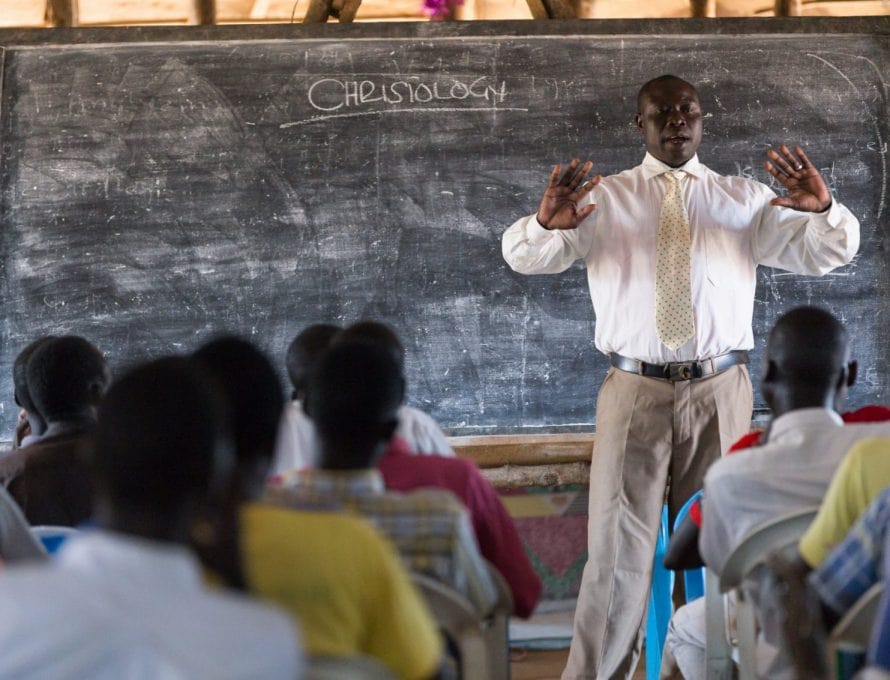SUB-SAHARAN AFRICA – “Let me stop you right there.”
The student looked confused and turned to me after I interrupted him. He was reading a passage that he thought was about financial giving in the church.
“Read the verse before the one that you just read.”
He read, “Do not judge, and you will not be judged. Do not condemn, and you will not be condemned. Forgive, and you will be forgiven” (Luke 6:37 CSB).
“Now reread the verse you read before.”
He read, “Give, and it will be given to you; a good measure — pressed down, shaken together, and running over — will be poured into your lap. For with the measure you use, it will be measured back to you” (Luke 6:38 CSB).
Now, I asked, “So what kind of giving is this passage talking about?”
As the student looked at both verses together, he (and the other students that day) realized Jesus is teaching about giving forgiveness — not money — in this passage. Jesus has plenty to say about giving our financial resources — just not in this passage.
A Vulnerable Flock
The need for sound biblical teaching and theological discernment in Africa is essential. Not only are people simply unaware of what the Bible teaches, but religious leaders are bombarding them with messages that contradict what the Bible teaches.
False teachings are rampant in Africa. Religious leaders use social media, radio, satellite TV, and the internet to broadcast the prosperity “gospel” (which is no gospel at all) and the false teachings of Neo-Pentecostalism (which is African Traditional Religion wearing Christian garb) to undiscerning sheep all across the continent. Their messages focus on God’s earthly blessings, but ignore mankind’s sin and our need for salvation in Christ alone through personal repentance and faith. As a result, churches across the continent are full of people who profess to love Jesus because they think He came merely to rescue them from earthly suffering, while the true gospel calls them to worship Him as Lord and Savior.
Without good shepherds to guide the flock here, the sheep are quickly led astray — and devoured.
A Good Shepherd’s Rod and Staff
Baz, a Zimbabwean seminary instructor and pastor, grieves over the current state of the church in his country and Africa as a whole. Baz was asked to join the AB316 task force of the Africa Baptist Theological Education Network. AB316 is a team of African theologians and a couple of IMB missionaries. The team derived the name AB316 from three key 3:16 verses in the Bible that help to define and guide their purpose.
- 2 Timothy 3:16 tells us that the Scriptures are altogether trustworthy, perfect and our only guide for our faith.
- John 3:16 reminds us that God’s love for the world should compel us to combat false teaching not out of rivalry but out of love for a lost and dying world.
- 1 John 3:16 teaches us that Christ’s love for us should be a model for the kind of self-sacrificing love that we should have for our brothers and sisters in the church all around the world.
Now Baz uses social media to send theologically solid, Bible-based messages — equipping pastors to be the types of shepherds who protect their sheep and seek the lost. The primary aim of AB316 is to educate African pastors about the false teachings that are dominating all denominations across Africa. Through various avenues, pastors are given tools to protect their flocks.
In addition to maintaining a website and social media accounts, the team is compiling a book predominately written by African authors that will be the foundation for discipleship materials that can be used to instruct seminary students, pastors and church members.
Southern Baptist churches can best help the AB316 team by earnestly praying. Please join us in praying that
- the African church will boldly stand against false theologies,
- pastors will protect their flocks, and
- a biblically rooted African theology will influence the rest of the world with the gospel.
The best thing the American church can do is pray and watch as African theologians, like Baz, take their place influencing the world for Christ.
###
Phil Barnes, who wrote this article, is a theological educator with IMB in Sub-Saharan Africa.

